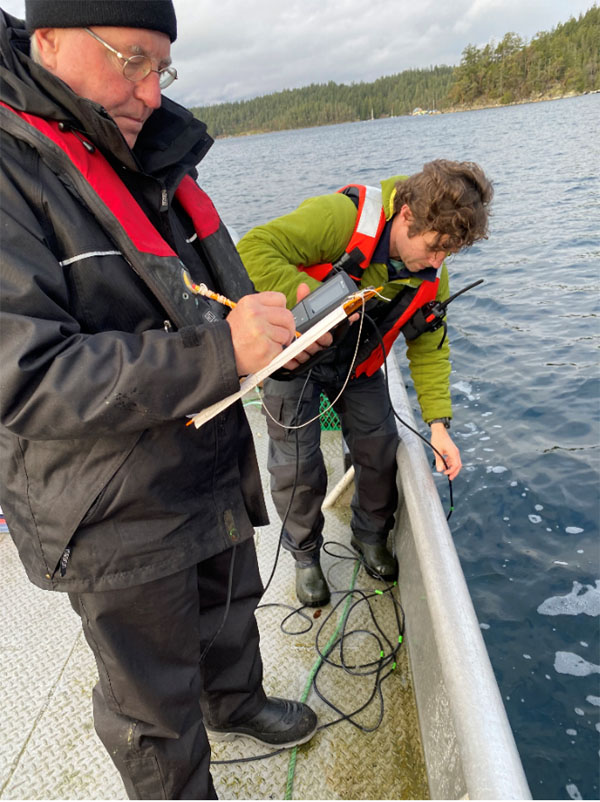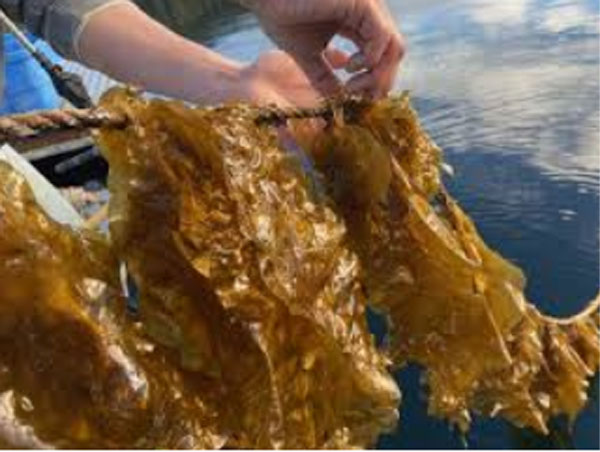|
|

|
  
Feature
Update 2021/3/18
Food security
 CASCADIA SEAWEED’S NEW TECHNOLOGY STRENGTHENS FOOD SECURITY & SAFETY CASCADIA SEAWEED’S NEW TECHNOLOGY STRENGTHENS FOOD SECURITY & SAFETY
By Suzanne Forcese
Intersecting with a growing public sentiment Cascadia Seaweed continues to raise the bar of transparency. Healthy eating and food source knowledge merge with the satisfaction of being part of a movement to mitigate climate change while ensuring food security and sovereignty.
Now thanks to support by the Canadian Agricultural Partnership, a federal provincial-territorial initiative to strengthen and grow the agricultural, agri-food and agri-based product sector with a new Traceability Technology System, it's clear sailing ahead for Cascadia Seaweed to fulfill their mission.
WATERTODAY had the pleasure of continuing the conversation with Bill Collins, co-founder of the British Columbia start-up. As the Company’s founders level up with the new technology of source to table there is an emerging shared connection between the ocean and the consumer.
Founded in 2019 by Bill Collins, Mike Williamson, and Tony Ethier – each had a connection with the ocean—from developing sonar systems for institutions around
the world, to commanding a Canadian naval base, to degrees in ocean science.

Bill Collins and Matt Obee, Aquaculture Operations Manager.
Traceability systems help build consumer confidence, making it possible to track the movement of food through production, processing and distribution. This information can be used to
protect public health and strengthen brand reputation. Photo Courtesy Cascadia Seaweed
“It was one of the first things we did out of the gate,” Collins tells WT regarding Cascadia’s application for traceability funding. “Understanding where food comes from and knowing that food preparation is safe is a big concern in our changing world.”
Cascadia Seaweed has established four farms off Vancouver Island (two in Barkley Sound and two in Discovery Islands) where it grows different types of seaweed including sugar kelp (Saccharina Latissima) and winged kelp (Alaria Marginata), while growing a red algae or dulse (Palmaria Mollis), in tanks on land. As the business continues to grow and evolve Cascadia plans to offer more varieties.

With more than 600 species available in B.C. seaweed is a versatile crop that can be used by restaurants and food processors and in products such as livestock feed, pet food, cosmetics and pharmaceuticals. Researchers are also using seaweed to develop plastic alternatives.
The traceability system documents where each variety of seaweed was grown, harvested, and processed.
“The system helps us in planning and food operations. We look at where the seeds come from in our data base. We take seeds from our lab and plant them. As the seaweed is growing, we can monitor progress.
“The technology is really helpful during harvest. When we are into heavy operation mode there isn’t the time to maintain a paper trail.”
A printer, a scanner and a computer make bar-coding each step of the journey from lab to planting to harvesting to food production to table simple, efficient and accurate.
“For example, once the data is in the computer we could say: OK, line 52 was used to fill up this code. When the code is sent to the factory a bar code reader scans it. As the journey continues, we follow the bar code to a secondary processing factory.
“So, if someone in Texas purchases a package of seaweed jerky, he can identify from the package bar code exactly where the seed from this jerky originated.”
Collins adds that the dream is to scan that bar code with a phone app that will take the consumer to a view of the farm where the seed originated –the very seed that journeys to the final product for the consumer.
“We’re not there just yet but we are headed there.”
For 2021 the technology will be used for rapid coding and scanning. in the following year Collins says the packaging coding is a definite and then by 2023 the consumer can view the food product’s origin back to the original seed.
“It is a world class plan for food security. Should there ever be a recall – which we don’t expect—we can isolate the source and find the issue. We think this should become an international model.”
Stepping onto the global stage, Collins adds, “We can’t wait to change the world!”
As industry leaders, Cascadia Seaweed is spearheading a festival – on a world stage May 17-23, 2021.
“We want to demonstrate that B.C. is ground zero for the next generation of global seaweed farming activities.” Learn more at www.seaweeddays.com
Related articles:
WORLD ECONOMIC FORUM IDENTIFIES CANADA’S
CASCADIA SEAWEED AS ONE OF ELEVEN GLOBAL INNOVATORS
CARRYING THE PAST INTO THE FUTURE WITH GUIDING PRINCIPLES - CHANGE IS RIPPLING THROUGH BC’S COASTAL COMMUNITIES
suzanne.f@watertoday.ca
|
|
|
Have a question? Give us a call 613-501-0175
All rights reserved 2026 - WATERTODAY - This material may not be reproduced in whole or in part and may not be distributed,
publicly performed, proxy cached or otherwise used, except with express permission.
|
| |